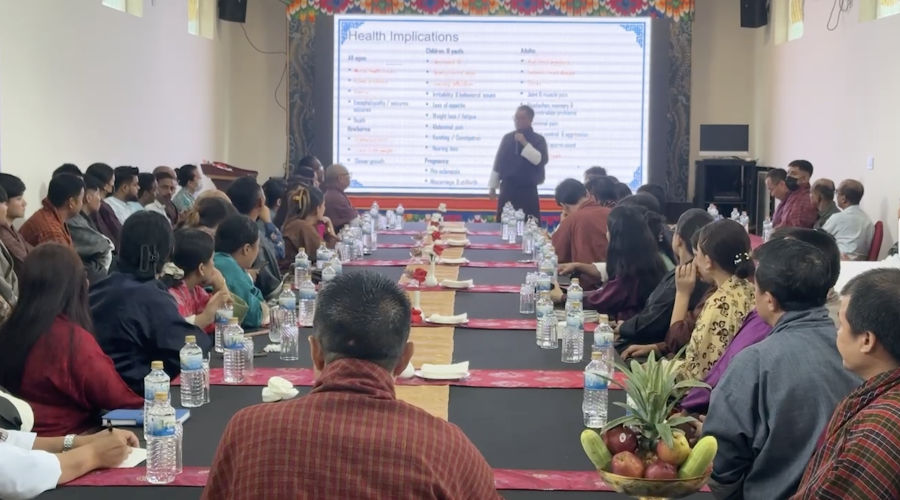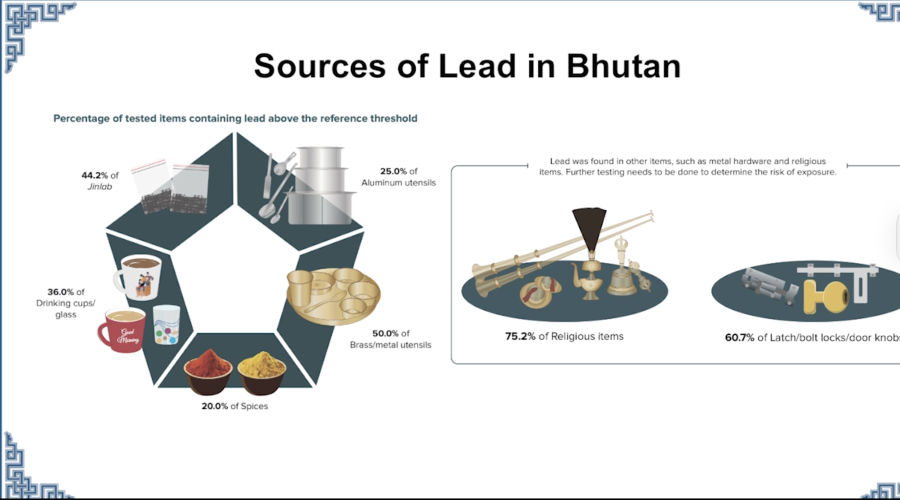 A national survey conducted last year found that nearly 76 per cent of children aged 1 to 6 have high lead content in their blood. The report states that even small amounts of lead can affect brain development, organ function and the overall health of a child. In response, the Ministry of Health has been conducting a series of advocacy programmes across the country. A team from the health ministry recently met with the business community in Phuentshogling.
A national survey conducted last year found that nearly 76 per cent of children aged 1 to 6 have high lead content in their blood. The report states that even small amounts of lead can affect brain development, organ function and the overall health of a child. In response, the Ministry of Health has been conducting a series of advocacy programmes across the country. A team from the health ministry recently met with the business community in Phuentshogling.
Almost 80 business owners residing in Phuentshogling Town took part in the one-day awareness programme.
According to health officials, not many people in the country are aware of lead exposure and its health implications.
Officials said no level of lead in the body is safe, which is why people need to know about lead poisoning, its sources and ways to minimise lead exposure.

“Advocacy is very important because many people are not aware of lead. Lead is not like any other metal because there is no safe amount of lead in your body. This is why it is very important to know about lead,” said Karma Wangdi, Programme Analyst, Ministry of Health.
According to the National Blood Lead Level Survey, three out of four children aged 1 to 6 have excessive lead levels in their blood (blood lead levels exceeding 3.5 micrograms per decilitre). The report also showed that three out of five pregnant or breast-feeding women and nearly nine out of ten children tested in monastic institutions had blood lead levels exceeding 3.5 micrograms per decilitre in their blood.
For the participants, the session has been informative and enlightening.
“Before attending the advocacy programme, we had never heard about lead exposure or its implications. We had no idea that lead is dangerous if it gets into our bodies,” said Tshering Dorji, a Businessman, Phuentshogling.
“We didn’t know about the harmful effects of lead. Thanks to the advocacy programme by the health ministry, we now understand lead, and I feel this is very useful. One important way to prevent lead exposure is washing hands frequently,” said Sonam Tshering, a Businessman, Phuentshogling.
Health officials said people can get exposed to lead through inhalation, ingestion or skin absorption.
Lead poisoning can lead to severe medical conditions like mental health issues, kidney problems, anaemia, seizures and even death.
In children, it can also cause developmental delays, behavioural issues, decreased IQ and many more.
As per the national survey, everyday items such as kitchen utensils, jinlab, spices, door latches or knobs and religious items were identified as sources of lead in Bhutan.
Apart from sensitising the different sections of society, the health ministry says it also plans to carry out other activities to address lead exposure.
“Right now, we are carrying out awareness programmes, but there are many other things to be done. We need to carry out research, there is a need to procure testing accessories and many more. So far, we have carried out trainings for health officials and ECCD facilitators in several dzongkhags,” said Karma Wangdi, Programme Analyst, Ministry of Health.
Along with sensitising the people, the health teams also conduct source testing to check for lead in various items. The ministry has carried out awareness programmes and lead testing in about nine districts so far and will carry out these programmes in the other districts as well.
Kinley Dem, Phuentshogling
Edited by Yeshi Gyaltshen







